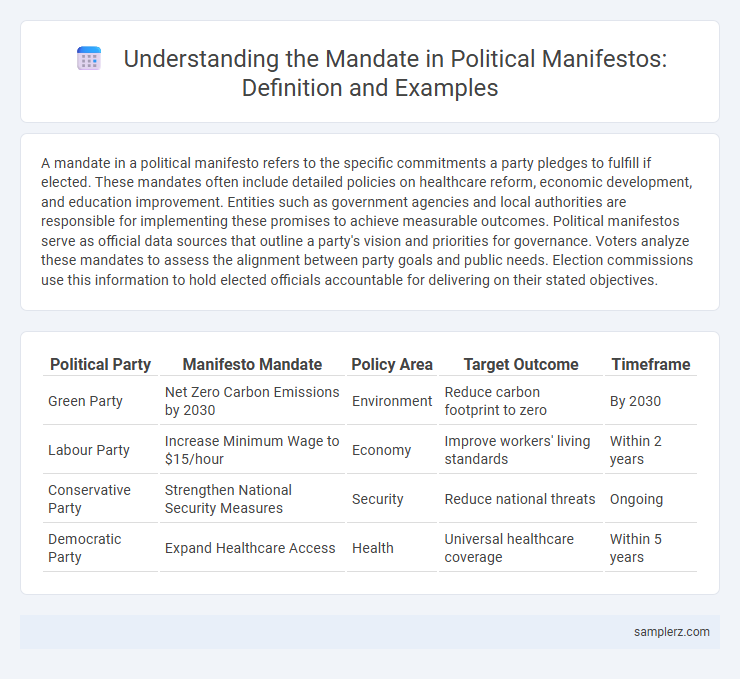A mandate in a political manifesto refers to the specific commitments a party pledges to fulfill if elected. These mandates often include detailed policies on healthcare reform, economic development, and education improvement. Entities such as government agencies and local authorities are responsible for implementing these promises to achieve measurable outcomes. Political manifestos serve as official data sources that outline a party's vision and priorities for governance. Voters analyze these mandates to assess the alignment between party goals and public needs. Election commissions use this information to hold elected officials accountable for delivering on their stated objectives.
Table of Comparison
| Political Party | Manifesto Mandate | Policy Area | Target Outcome | Timeframe |
|---|---|---|---|---|
| Green Party | Net Zero Carbon Emissions by 2030 | Environment | Reduce carbon footprint to zero | By 2030 |
| Labour Party | Increase Minimum Wage to $15/hour | Economy | Improve workers' living standards | Within 2 years |
| Conservative Party | Strengthen National Security Measures | Security | Reduce national threats | Ongoing |
| Democratic Party | Expand Healthcare Access | Health | Universal healthcare coverage | Within 5 years |
Defining a Mandate in Political Manifestos
A mandate in political manifestos represents a clear commitment by candidates or parties to deliver specific policies if elected, serving as a contract with voters. It outlines prioritized goals such as economic reform, healthcare improvements, or education enhancements, providing a measurable framework for political accountability. Defining mandates precisely strengthens voter trust and clarifies the governing agenda post-election.
Historical Examples of Mandates in Party Manifestos
The Labour Party's 1945 manifesto promised the establishment of the National Health Service, leading to a clear electoral mandate for widespread social reform. In 1983, the Conservative Party's manifesto emphasized privatization and economic liberalization, reflecting a strong mandate that shaped UK economic policy for a decade. Franklin D. Roosevelt's 1932 Democratic campaign featured a mandate for the New Deal, transforming American social welfare and government regulation.
Mandate Commitments in Election Campaigns
Mandate commitments in election campaigns often include specific policy goals such as reducing unemployment rates by 5% within four years or implementing universal healthcare access by the end of the term. These promises are designed to create measurable outcomes that voters can hold elected officials accountable for during their tenure. Clear mandates like increasing renewable energy usage to 50% by 2030 also serve to align party platforms with voter priorities and legislative agendas.
Impact of Mandates on Voter Trust
Mandates outlined in political manifestos significantly influence voter trust by clearly defining the promises and policies candidates commit to implementing. When elected officials fulfill these mandates, public confidence in the political system strengthens, enhancing democratic engagement. Conversely, failure to honor manifesto commitments often results in voter disillusionment and decreased electoral participation.
Notable Fulfilled Manifesto Mandates
Notable fulfilled manifesto mandates include the implementation of universal healthcare systems, significant tax reforms targeting wealth redistribution, and the expansion of renewable energy infrastructure to meet climate goals. Governments that have successfully delivered on these promises often see increased public trust and electoral success in subsequent terms. Effective tracking of mandate fulfillment enhances transparency and accountability in political governance.
Mandate Implementation: Success and Challenges
Mandate implementation in political manifestos showcases varied success, with policies such as universal healthcare expansion achieving notable improvements in public access and health outcomes. Challenges often arise from budget constraints, bureaucratic resistance, and shifting political alliances, which can delay or dilute promised reforms. Despite these obstacles, effective stakeholder engagement and transparent progress reporting enhance accountability and public trust in fulfilling electoral promises.
Manifesto Mandates and Government Accountability
Manifesto mandates serve as explicit commitments that political parties present to voters, outlining specific policies and goals they intend to pursue if elected. These mandates create a framework for government accountability by providing measurable benchmarks against which the public and watchdog institutions can assess the administration's performance. Clear articulation of manifesto mandates enhances transparency and empowers constituents to hold elected officials responsible for delivering promised outcomes.
Differences Between Promise and Mandate in Manifestos
A mandate in a political manifesto refers to the authoritative directive claimed by a party after winning an election, signaling public approval to implement specified policies, whereas promises are commitments made to voters during the campaign that may lack binding authority. Mandates involve a broader validation of the party's agenda, often based on the overall electoral victory and voter turnout, while promises are discrete, specific pledges intended to secure votes. Understanding the difference clarifies how election outcomes translate into government actions, highlighting the contrast between aspirational goals and actual governing legitimacy.
International Examples of Manifesto Mandates
The 2019 UK Conservative Party manifesto included a clear mandate to "Get Brexit Done," securing a decisive majority by emphasizing the completion of the UK's EU withdrawal. In Germany, Angela Merkel's CDU/CSU coalition manifesto in 2017 focused on strengthening the EU's unity and expanding international trade agreements to enhance Germany's global economic position. Meanwhile, Canada's Liberal Party 2015 manifesto prioritized re-engaging with international partners through climate change agreements like the Paris Accord and rebuilding diplomatic relations.
Lessons Learned from Broken Manifesto Mandates
Broken manifesto mandates often reveal the critical gap between electoral promises and practical governance, highlighting the importance of realistic policy planning and transparent communication. Voters frequently experience disillusionment when key manifesto commitments, such as economic reforms or social welfare programs, remain unfulfilled due to political compromise or resource constraints. Lessons learned emphasize the need for robust accountability mechanisms and adaptive strategies to maintain public trust and promote sustainable political engagement.

example of mandate in manifesto Infographic
 samplerz.com
samplerz.com